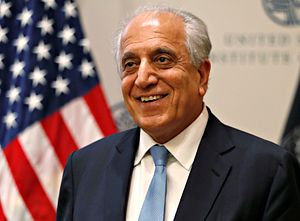The peace talks between the Afghan Taliban and the United States have not progressed despite the fact that both parties have steadily been meeting for weeks.
There has not been any significant news when it comes to the parties mutually agreeing to some sort of overarching peace formula. About two months ago, a peace plan that was reportedly proposed and drafted by the RAND corporation was projected as an agreement that the Taliban and the U.S. may sign on in the near future. The reports related to the future of the RAND formula have also gone out of the picture, for that document has been criticized as being too simplistic and academic.
So, why have both parties been meeting for weeks and yet there is no reported progress in talks except the news that significant differences remain concerning both party’s positions?
Arguably, the ongoing talks between the U.S. and Taliban are perhaps the only bout of serious engagement over the past decade. All previous initiatives to engage the group fell apart right after they began. One of the reasons that the current engagement between the two parties has continued is due to Washington’s intent to keep the Taliban engaged at any cost.
There is a clear urgency on the part of the American government to find some sort of solution to the Afghan conflict that can offer the former an option to leave Afghanistan, which Washington apparently desires. This has been the driving force for American officials that are working on the subject.
Apparently, there is clear focus on the part of the United States to build a direct relationship with the Taliban. While the U.S. has remained in touch with the Taliban directly or via other methods, the relationship between the two actors has always lacked trust. This has been primarily due to Washington’s constantly changing position on the conflict and the Taliban’s refusal to engage with Washington. For much of the present war, he insurgent group has not been forced into a situation where it had to take huge militarily losses or was isolated politically and financially to the extent that the only way out for the movement was to make an agreement with the Afghan government and its international support base, particularly the United States.
Perhaps the only such occasion was during the early years of Washington’s intervention in Afghanistan. Anand Gopal, in his book No Good Men Among The Living notes that within months of the U.S. intervention in 2001, Taliban leaders wanted to surrender but were repeatedly turned down in a series of blunders that are detailed in the book. The Taliban had stopped fighting as they either fled to Pakistan or joined civilian ranks. There was no one to fight except by knocking down houses on false intelligence reports, which were fed by local feudal lords to settle scores. In return, the U.S. had an ample supply of terrorists for arrests. Gopal further notes that “Taliban had abandoned the cause yet U.S. special forces were on Afghan soil with a clear political mandate to defeat terrorism… How do you fight a war without an adversary?”
Arguably, the early years of intervention offered the real possibility to the U.S. when it comes to making an agreement with the Taliban on its own terms or be in a position to make an agreement if the country desires to do so. The situation has reversed now: The U.S. wants to leave the country even if it has to make an agreement on the Taliban’s terms. Even with the scenario where the Taliban’s almost all demands are met, it’s open for debate whether the group is interested in making an agreement anytime soon.
In this regard, the urgency has grown to the extent that Washington wants to keep the group engaged even if only means building trust with the organization. A few days ago, the U.S. cut relations with Afghan President Ashraf Ghani’s national security adviser as he questioned Washington’s approach to deal with the Taliban. President Ghani’s national security advisor blamed Washington top negotiator in Afghanistan, Zalmay Khalilzad, for downgrading the Afghan government’s demands during the negotiations with the group. Apparently, there is an understanding in Kabul that for Washington, the withdrawal of its forces and an agreement on the issue of harboring militant groups in Afghanistan is the top priority. However, for the government in Kabul, the nature of the Taliban’s role in Afghanistan’s political future is more important than questions surrounding the entire dialogue.
Some observers may not admit it, but the current situation concerning the ongoing discussion between the U.S. and the Taliban is a clear capitulation when it comes to Washington’s overall vision and mission for the country. Washington has neither been able to defeat terrorism in Afghanistan nor is the country in a position to strike a deal with the group on its own terms. Clearly, the deal will take place when the Taliban wants to make a deal and no one is certain when that is going to happen. For now, Washington is intent on keeping the group engaged if it has to, be at the cost of alienating its allies in the government in Afghanistan. In this entire condition, no one is sure whether the country’s political future after Washington’s impending withdrawal. As things stand, the U.S. wants to do what it said it wouldn’t about two decades ago.

































